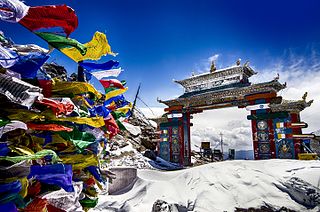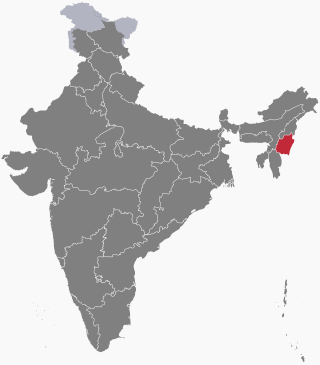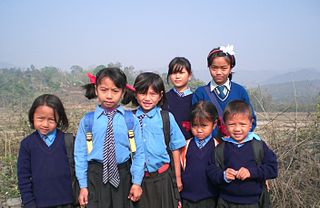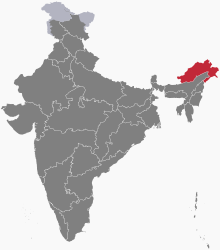
Arunachal Pradesh is a state in northeast India. It was formed from the North-East Frontier Agency (NEFA) region, and India declared it as a state on 20 February 1987. Itanagar is its capital and largest town. It borders the Indian states of Assam and Nagaland to the south. It shares international borders with Bhutan in the west, Myanmar in the east, and a disputed 1,129 km border with China's Tibet Autonomous Region in the north at the McMahon Line.

Northeast India, officially the North Eastern Region (NER), is the easternmost region of India representing both a geographic and political administrative division of the country. It comprises eight states—Arunachal Pradesh, Assam, Manipur, Meghalaya, Mizoram, Nagaland and Tripura, and the "brother" state of Sikkim.
Armed Forces Act (AFSPA), 1958 is an act of the Parliament of India that grants special powers to the Indian Armed Forces to maintain public order in "disturbed areas". According to the Disturbed Areas Act, 1976 once declared 'disturbed', the area has to maintain status quo for a minimum of 3 months. One such act passed on 11 September 1958 was applicable to the Naga Hills, then part of Assam. In the following decades it spread, one by one, to the other Seven Sister States in India's northeast. Another one passed in 1983 and applicable to Punjab and Chandigarh was withdrawn in 1997, roughly 14 years after it came to force. An act passed in 1990 was applied to Jammu and Kashmir and has been in force since.

The National Democratic Front of Boroland (NDFB) was an armed separatist outfit which sought to obtain a sovereign Boroland for the Bodo people. It is designated as a terrorist organisation by the Government of India.

The Insurgency in Northeast India involves multiple separatist militant groups operating in some of India's northeastern states, which are connected to the rest of India by the Siliguri Corridor, a strip of land as narrow as 14.29 miles (23.00 km) wide.

Terrorism in India, according to the Home Ministry, poses a significant threat to the people of India. Compared to other countries, India faces a wide range of terror groups. Terrorism found in India includes Islamic terrorism, ultranationalist terrorism, and left-wing terrorism. India is one of the countries most impacted by terrorism.

The Naga conflict, also known as the Naga Insurgency, is an ongoing conflict fought between the ethnic Nagas and the governments of India in northeastern India. Nagaland, inhabited by the Nagas, is located at the tri-junction border of India on the West and South, north and Myanmar on the East.

The National Socialist Council of Nagaland (NSCN) is a Naga militant and separatist group operating mainly in northeastern part of India, with minor activities in northwest Myanmar (Burma). The main aim of the organisation is allegedly to establish a sovereign Naga state, "Nagalim", which would consist of all the areas inhabited by Naga tribes in Northeast India and northwest Myanmar. India claims that China and Pakistan provide financial support and weaponry to the NSCN. Drug trafficking and extortion are believed to be other major sources of income for the NSCN.
Naga nationalism is an ideology that supports the self-determination of the Naga people in India and Myanmar, and the furtherance of Naga culture.
Secession in India typically refers to state secession, which is the withdrawal of one or more states from the Republic of India. Whereas, some have wanted a separate state, union territory or an autonomous administrative division within India. Many separatist movements exist with thousands of members, however, some have low local support and high voter participation in democratic elections. However, at the same time, demanding separate statehood within under the administration of Indian union from an existing state can lead to criminal charges under secession law in India. India is described as an ‘Union of States’ in Article 1 of the Indian constitution I.e "Indestructible nation of destructible states" by its father of constitution Dr. Bhimrao Ramji Ambedkar where a state or Union territory of India cannot secede from India by any means and the Central Government has more powers than the respective state governments and can forcefully change the names and boundaries of the states without their permission at any time when needed for self interest and for the maintenance of integrity.

Human rights issues in northeast India have been widely reported in the press and by human rights activists. Northeast India refers to the north-easternmost region of India consisting of the states of Arunachal Pradesh, Assam, Manipur, Meghalaya, Mizoram, Nagaland, Sikkim, and Tripura, as well as parts of northern West Bengal.

Operation All Clear was a military operation conducted by Royal Bhutan Army forces against Assam separatist insurgent groups in the southern regions of Bhutan between 15 December 2003 and 3 January 2004. It was the first operation ever conducted by the Royal Bhutan Army.

The Insurgency in Meghalaya is a frozen armed conflict between India and a number of separatist rebel groups which was taking place in the state of Meghalaya. The Insurgency in Meghalaya is part of the wider Insurgency in Northeast India, and was fueled by demands of the Khasi, Synteng and Garo people for a separate state.

The Insurgency in Manipur is an ongoing armed conflict between India and a number of separatist rebel groups, taking place in the state of Manipur. The Insurgency in Manipur is part of the wider Insurgency in Northeast India; it displays elements of a national liberation war as well as an ethnic conflict.

Shangwang Shangyung Khaplang was a Burmese leader of Naga ethnicity. He was the leader of the NSCN-K, an insurgent group that operates to establish a Greater Nagaland, a sovereign state bringing all Naga-inhabited areas of Myanmar and India under one administrative setup.

The insurgency in Tripura was an armed conflict which took place in the state of Tripura between India and several separatist rebel organisations. It was a part of the wider insurgency in Northeast India and was fueled by Tripuris.

The hill tribes of Northeast India are hill people, mostly classified as Scheduled Tribes (STs), who live in the Northeast India region. This region has the largest proportion of scheduled tribes in the country.

Border disputes of Northeast India mainly include inter-state conflict between Assam–Mizoram, Assam–Arunachal Pradesh, Assam–Nagaland and Assam–Meghalaya. The disputes, including clashes between rival police forces, have resulted in the loss of life, livelihood and property. The border disputes in some cases are part of the larger national (separatist), sub-regional and ethnic conflicts, as well as criminal enterprise fuelled. This internal land conflict in the districts of the northeast are part of the 322 districts affected by ongoing land conflicts out of a total of 703 districts in India.
The 2011 Tirap Ambush was a violent clash within the National Socialist Council of Nagaland (NSCN) between the NSCN--Isak Muivah (NSCN-IM) and the NSCN--Khaplang (NSCN-K) militant groups on the Indo-Myanmar border of Tirap district, in Eastern Arunachal Pradesh, India.














